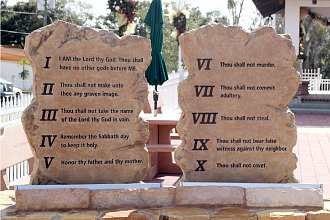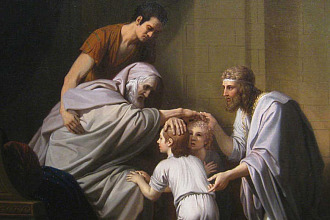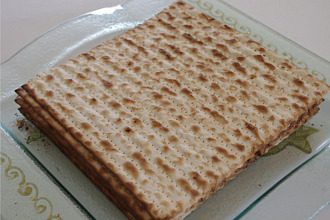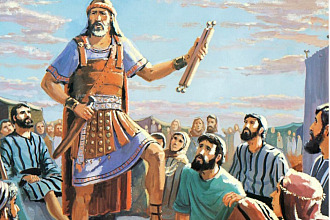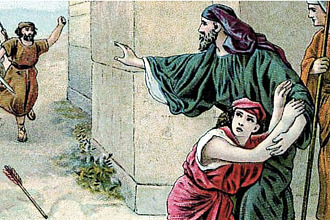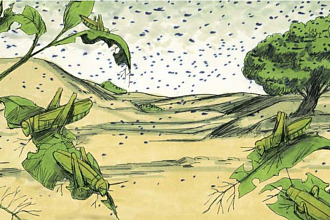Parasha for the Week: Ekev: Deuteronomy 7:12 – 11:25
Haftarah: Isaiah 49:14 – 51:3
Apostolic Writings: Romans 14:1 – 9
Overview:
If Bnei Israel carefully observe all the mitzvoth (commandments) Moshe promises them that they will be the most blessed of the nations of earth.
Moshe tells Bnei Yisrael that they will conquer Eretz Canaan little by little, so that the land will not be overrun by wild animals before Bnei Yisrael are able to settle the whole land.
Moshe stresses that the Torah is indivisible and not open to partial observance.
The Land of Israel is described as a land of wheat, barley, grapes, figs, and pomegranates, a land of oil-yielding olives and date honey.
Moshe cautions Israel not to become haughty and think that their success in the land of Israel is a result of their own powers or vigor; rather, it was Hashem who gave them wealth and success.
Nor did Hashem drive out the Canaanites because of the people of Israel's righteousness, but rather because of the sins of the Canaanites; for the road from Sinai had been a catalogue of large and small sins and rebellions against Hashem and Moshe.
Moshe details the events after Hashem spoke the 10 Commandments at Sinai, culminating in his bringing down the second set of Tablets.
Aharon's passing is recorded as is the elevation of the levi'im to Hashem's ministers.
Moshe points out that the 70 people who went down to Egypt have now become like the stars of the heaven in abundance. Reviewed are the blessings that accompany keeping mitzvot and the curse that results from non-observance.
"The Righteous and His Blessings"
The parashah starts with this verse: “Then it will happen, as a result of your listening to these ordinances, when you keep and do them, that Hashem your God will keep with you the covenant kindness that He swore to your fathers.” (Deuteronomy 7:12) In the preceding parashah the last verses explained that the truly righteous individual will not receive his personal reward for his good deeds while he himself is still on earth. Here Scripture describes the blessings that will come to the community if it lives in accordance with its duty. These Blessings come as a result of such a life, they are not rewarding to be pursued for their own sake. Rabbi Hirsch says “that is why all the commandments of the Torah are subsumed here under one term Hamishpatim they are none other than legal axioms through which the many varied aspects and relationship of physical and spiritual life of both individual and nation receive their rightful due, in accordance with the standard of Tsedek the Divinely-set ideal state of the world.
"Keeping the Mitzvot"
This week’s Parashah, ‘Ekev, as the rest of the fifth book of the Torah, Devarim (Deuteronomy), records Moshe’s words to the people of Israel before his death.
Knowing that he will not enter the promised land, Moshe spends his final days preparing the Jewish nation for the future. He cautions them to adhere to all the mitzvot (commandments) of God especially when they enter Israel; their physical and spiritual good and welfare depends on their actions.
He reminds them of the importance of keeping the mitzvot for which, in return, God too, will fulfill His promises to them; “And He will love you and bless you and multiply you; He will bless the fruit of your body [children] and the fruit of your land...” (Deuteronomy 7:13). Moshe mentions the sin of the Golden Calf and warns Israel not to repeat their past mistakes.
"Faithful to G-d"
Chapter 8 of Deuteronomy is a new exhortation to be faithful to God and His commandments: “You are to take care to do the whole mitzvah that I am commanding you today, so that you may live and multiply and go in and possess the land that Hashem swore to your fathers.” (Deuteronomy 8:1). Eretz Yisrael will be a great land of milk of honey, but only if the people are faithful to Hashem. During the time of Eliyahu Hanavi, it did not rain in the land for more than three years. People were dying because the country became so dry that there was no food anymore. In Deuteronomy 8, the land of Israel is described as a land of blessings: ““For Hashem your God is bringing you into a good land—a land of wadis with water, of springs and fountains flowing out in the valleys and hills, a land of wheat and barley, vines, figs and pomegranates, a land of olive oil and honey, a land where you will eat bread with no poverty, where you will lack nothing, a land whose stones are iron, and out of whose hills you can dig copper. So, you will eat and be full, and you will bless Hashem your God for the good land He has given you.” (Deuteronomy 8:7-10). But this land will provide everything only if God’s blessings are upon it. In this text we have the very famous “7 Species” or fruits of the Promised Land: wheat, barley, vines, figs, pomegranates, olive, honey (which is translated by some as “dates”).
Haftarah: Isaiah 49:14 – 51:3
This Shabbat is the second Shabbat after Tisha B'Av. This period is called, Shiva D'nechemta—"Seven weeks of comfort." The seven Haftarot of the week between Tish'a B'av and Rosh Hashana are prophesies of comfort and hope for Israel and God's people at large.
Haftara: The text of Isaiah continues to comfort Israel. From time to time Israel can contemplate, "The LORD has forsaken me, my Lord has forgotten me" (Is. 49:14). The L-rd answers, "Can a woman forget her nursing child, or show no compassion for the child of her womb? Even these may forget, yet I will not forget you" (15). We already said that the L-rd loves his people with an everlasting love. He will never forget his people. "See, I have inscribed you on the palms of my hands; your walls are continually before me " (16).
"Thus says the Lord G-D: I will soon lift up my hand to the nations, and raise my signal to the peoples; and they shall bring your sons in their bosom, and your daughters shall be carried on their shoulders" (22). "I will make your oppressors eat their own flesh, and they shall be drunk with their own blood as with wine. Then all flesh shall know that I am the LORD your Savior, and your Redeemer, the Mighty One of Jacob" (26). "Why was no one there when I came? Why did no one answer when I called?" (Is. 50:2). There is a beautiful structure of the text "The Lord G-d helps me; therefore I have not been disgraced" (7) in parallel with "It is the Lord G-d who helps me; who will declare me guilty? (9).
Apostolic Writings: Romans 14:1 - 9
Rabbi Shaul who is the author of this letter to gives a lesson of tolerance and acceptation of others, those who are thinking differently of us within our community: “Now accept the one who is weak in faith, but not for the purpose of disputes about opinions.” (Romans 14:1). It is so easy to lose the purpose of our mission, spending time to discuss private opinions and not to share the good news of Yeshua.
According to Rabbi Shaul, there are people who are eating only vegetables and who are considered in our text as “weak.” It is written: “One person has faith to eat anything, but the weak eats only vegetables.” (Romans 14:2). It is not an easy text, especially for vegetarian people. Today to be vegetarian is a way to save the resources of the planet, it is an important role we received from God as steward of God’s creation. However, there are always people who use this text to speak against vegetarians, or who say that vegetarianism is not what the Bible teaches and according to this text the vegetarians are “weak” in their faith.
It is clearly not the teaching of this text. To understand the meaning of what Rabbi Shaul said, we, as always, have to put this text in is context, and to check if our conclusion is in agreement with the other teaching of Rabbi Shaul. Rabbi Shaul was a Torah observant, he was a Jew and spoke according to his knowledge of the Jewish culture and traditions. Never he would advocate non kosher food, and he certainly, on many occasion ate only vegetables because he did not find kosher meat on the market.
The context of this text is not vegetarianism, because in this text we read: “One person esteems one day over another while another judges every day alike. Let each be fully convinced in his own mind.” (5). Those who like to spend hours discussing opinions are using this text to teach that we don’t need to keep the Shabbat in order to be faithful to Yeshua.
These texts are not about people who would like to respect the biblical principle of kosher food, or about people who would like to be faithful to the Ten commandments, observing the 4th commandments which requires worshiping on Shabbat. Reading the text further it is said: “The one who observes that day does so to the Lord. The one who eats, eats to the Lord, for he gives thanks to God; and the one who abstains, abstains to the Lord, and he gives thanks to God.” (Romans 14:6). The context is clear, it is eating and not eating food in connection with days.
Let’s remember the context, on the first century, when the majority of the believers came from a sort of rabbinical Judaism, and more and more new believers came from Gentiles, There was conflict between Observant Jews and Gentiles. Why? There were among these people, some who made distinction between days in connection with foods. That means, they were ready to accept to eat meat and on some other days they did not want to eat meat, but only vegetables.
Once again to understand the problematic of this chapter, we have to remember some Jewish practices of the first century. At that time, there were two special days each week; these days were Mondays and Thursdays. In fact, they are still special days for the Jewish people today. Jews pray at home or in synagogues three time a day, every day. But the morning prayer of Mondays and Thursday are special in synagogues, on that day, the Rabbi or worship leader open the Torah scrolls for a reading of a portion of the parashah. The reading of the parashah from the Torah scrolls is done on Mondays, Thursday, and Shabbat.
In the time of Yeshua and Rabbi Shaul, these two days were celebrated by observant Jews who wanted to be faithful to the rabbinical prescriptions. These people were fasting and added special prayers on their liturgy on these special days. Fasting on other days than Yom Kippur was eating only vegetables not any meat. We have an allusion of these two days in the besorah. Yeshua was giving a teaching to his disciples: “Then Yeshua spoke this parable to some who trusted in themselves that they were righteous, while holding others in contempt.” (Luke 18:9) to illustrate his teaching, while he was in the temple, he gave the example of two different worshipers, one was a Pharisee and the second one was a taxes collector. The prayer of the Pharisee was the prayer of a self-righteous man, he said to God in order to increase his merits: “I fast twice a week and give a tenth of all I get.” (Luke 18:12). These two days of fast were Mondays and Thursdays.
After the death and resurrection of Yeshua, when Jews and Gentiles accepted Yeshua, a new situation was created. They started to live together, while before, never a Jew would go to the house of a Gentile. In this context, Pharisees Jews who accepted Yeshua, as those mentioned in Acts 15:5, who thought that we should observe all the prescriptions of the Oral Law given by the Sanhedrin and other Rabbis, continued to fast on Mondays and Thursdays, they continued to practice their religion in the same way as before. On the other hand, Gentiles did not consider themselves subjected to these Jewish practices which were not written in the Torah. Thus, when a Gentile invited a Jew to eat in his home a Monday or a Thursday, the Gentile cooked normal biblical (Kosher) food, but the Jew was not comfortable eating meat (even Kosher meat) on that special days, and refused to eat them asking his host to eat only vegetables. We can understand that in the context of Middle East hospitality, refusing eating some food would raised some conflicts between Jews and Gentiles.
When Rabbi Shaul heard about these conflicts, he clearly said that those who make distinction between days and eat only vegetables and not meat are the weak people, in the sense that they don’t understand their freedom in Yeshua. Although we don’t have to judge them until the Ruach Hakodesh will give them more light and they will understand that in Yeshua we don’t need to follow these non biblical traditions.
Rabbi Shaul shows in this chapter, that Jews and Gentiles can live together, can eat together. Monday and Thursday are not special days about prayers and eating.
Let’s remember that we are new creatures in Yeshua HaMashiach, and not subject anymore to human prescriptions: “For none of us lives for himself, and none dies for himself. For if we live, we live for the Lord; and if we die, we die for the Lord. So whether we live or die, we belong to the Lord. For this reason Messiah died and lived again, so that He might be Lord of both the dead and the living.” (Romans 14:7–9).









